
Get on a flight to Tel Aviv. Volunteer to help our brothers and sisters in Israel. The need is great. The range of opportunities to make a difference is virtually limitless. You will return stronger.
The State of Israel declared independence on May 14, 1948, and was immediately attacked by the combined forces of five Arab armies who joined up with domestic Arab militias. Paramilitary organizations (the Palmach, Irgun and Lehi) defended the infant nation and were reconstituted as the Israel Defense Forces. Vastly outnumbered, the IDF prevailed, thanks in no small part to volunteer fighters and airmen from more than 40 countries. They were known as the Overseas Volunteers, Mitnadvei Chutz L’Eretz. Their organization, known by the acronym Machal, continues to this very day.
Israel is at war again. Thankfully, it is not short on soldiers. The response to the reservist call-up at the start of the war far exceeded 100%. However, the country faces severe shortages in more humdrum areas of its workforce. This is particularly true in the agricultural sector, where Israel had relied heavily on foreign and Palestinian labor that is no longer available.
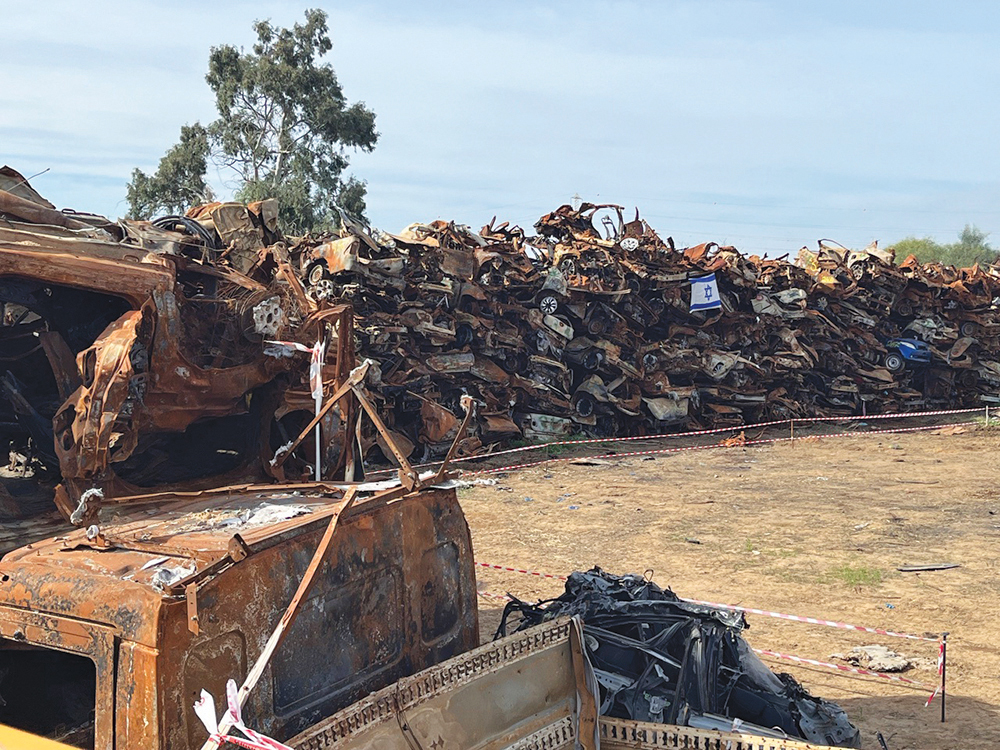
In response, as much as half the Israeli population has volunteered in some capacity. Echoing the early Machal volunteers, thousands of Jews from the Diaspora have flown in to help. They have been joined by many non-Jewish friends of Israel including cowboys from Arkansas and Montana, and firefighters from Boca Raton.
Some volunteers come as part of organized groups. Others come on their own. The latter—which includes me—simply get on an El Al flight (the only option at the time of writing) and create an impromptu program for themselves. All that is needed is access to one or two WhatsApp groups with limitless opportunities to help. Ask 100 volunteers how they spent their time in Israel and you will get 100 different responses.
My reaction to October 7 mirrored that of most everyone I know. Shock was replaced with pain then an obsessive need to keep up with rapidly changing news. Crying led to intensified prayer and philanthropy. Eventually I realized I needed to do something substantive. With the support of my wife, I decided to spend a week volunteering in Israel in early January.
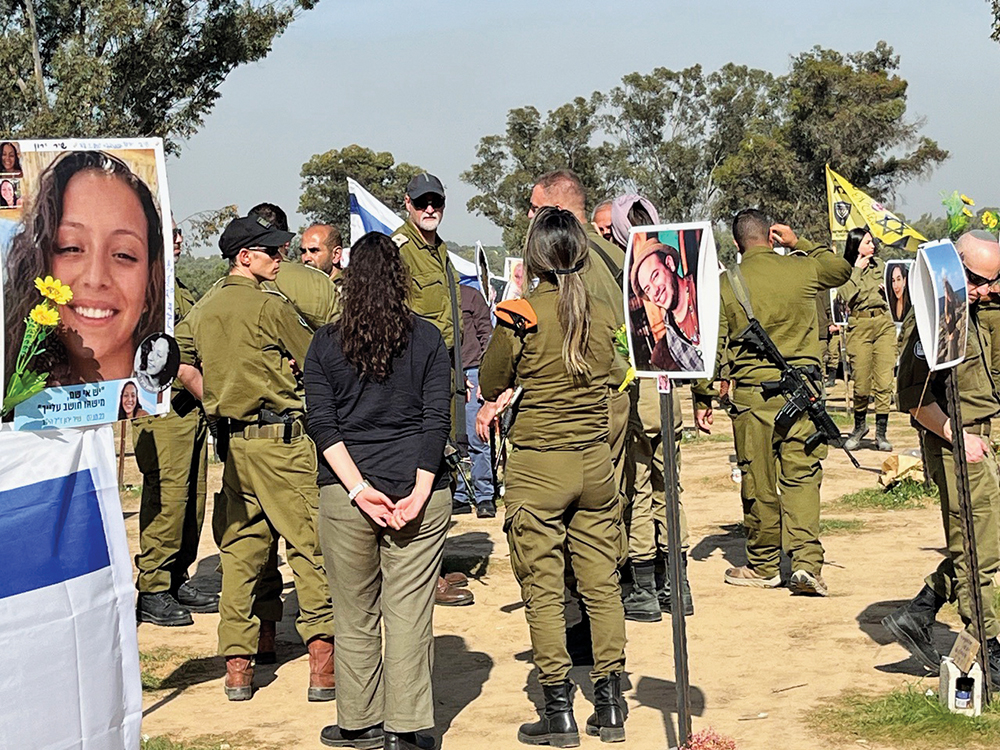
I flew in with a duffel bag of donated clothing for displaced families. My time was spent largely in agriculture. I planted onions at a farm in the Sharon region and spent a few days picking clementines on moshavim in Otef Aza, the Gaza perimeter communities. The latter was through Leket. (Tragically, the son-in-law of Leket’s founder was killed in action in Gaza while I was in Israel.)
Working in a citrus orchard within four miles of an active war zone, hearing the distant pounding of Israeli artillery, is somewhat surreal. Our days began with a disclaimer. We would be too close to the border to react to incoming rockets. Sirens do not sound in orchards. The Iron Dome is inoperative in unpopulated areas. There are no concrete shelters for protection. Fortunately, all was quiet, and we succeeded in harvesting the clementines.
With my brother, I volunteered at Eran’s Angels at the Tel Aviv Expo. Here, donated articles are received, sorted, packed and distributed to soldiers and the tens of thousands of civilians who have been displaced from their homes in the north and south of the country.
Sadly, so many chayalim have fallen, and I made a point of visiting a shiva house. The soldier was a member of the Yahalom unit. (They destroy Hamas tunnels.) He was an only child. His rosh yeshiva told me it was essential. I tell his grieving parents that I had come from abroad.
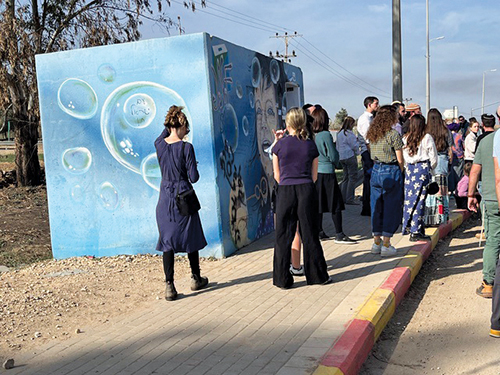
Everyone seems to know someone who was killed on October 7 and/or during the war. A farmer in whose orchard I volunteered told us he lost 13 friends on that day. His moshav was not attacked thanks solely to the all-female tank unit that repelled more than 100 invading terrorists.
A most uplifting experience was joining a group to visit soldiers at rest stops near the Gaza border. I had been told they appreciate letters from children in the Diaspora. It was heartwarming to see them smile as they read letters written by our youngest son and his second-grade classmates. These rest stops are run by generous families who provide a wholesome meal away from the battlefield. Ad hoc live entertainment is provided by volunteers who pick up a guitar or sit by the drums and sing for the soldiers. A lovely surprise was the realization that one soldier with whom I spoke is from Bergen County and that as a child, he had attended our second-grader’s school. Our group also visited an Iron Dome battery.
I felt it was important to bear witness to that cursed day. Our group visited the “car graveyard” where hundreds of incinerated cars are piled on top of each other. We visited Re’im, where the Nova music festival took place. That now-sacred ground bears very little sign of the brutality it witnessed. Haunting posters of many of the 364 beautiful young people murdered there are placed on poles throughout the main party site. Our bus drove down Route 232, now infamous as the “road of death” that we all saw on CNN. We visited a roadside concrete shelter where partygoers had hidden in vain before being murdered or taken hostage.
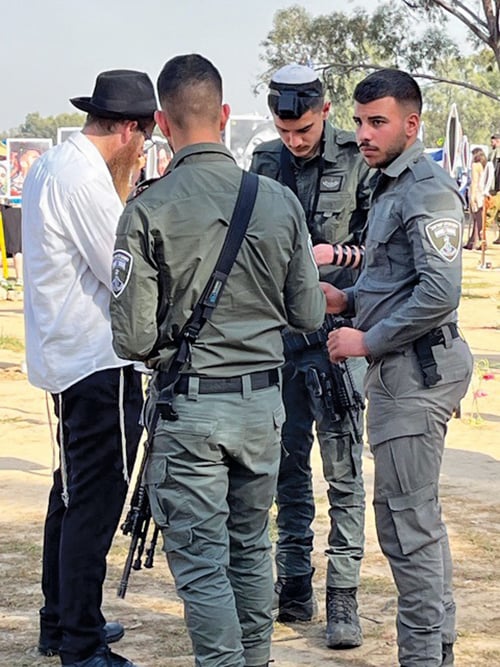
A museum to the terrible events at Re’im is located at the Tel Aviv Expo. It is so new that surviving articles from the site are still being added to the display. Presumably this will one day relocate to Re’im.
At Hostage Square in Tel Aviv, I listened to families and friends of hostages talk about their loved ones still held in Gaza.
Stickers on lampposts call attention to individual hostages or victims. The three-month mark to October 7 passed while I was in Israel and on that night, I attended a candlelight vigil at the iconic Dizengoff fountain. Even the Kotel felt different. Very quiet.
Over the entire trip, I did not hear a voice raised nor a car honking. For anyone who has spent any amount of time in Israel, that is significant. It seems every billboard, bus stop and electronic sign calls for release of the hostages or for unity. Expressions such as “Yachad Nenatzeach” (together we will be victorious) are everywhere. My family had been in Israel for much of the summer. It was lovely, though the country was anything but united then due to the judicial reform initiative.
There are no answers to the question of how the attack could have happened. But there has been a well-documented return to spirituality and religion in response. It has been widely reported that soldiers are wearing tzitzit (the production of which is a volunteer activity) and I saw many putting on tefillin for what seemed to be the first time in years, if not ever. I heard from singles that everyone wants to get married now and start a family.
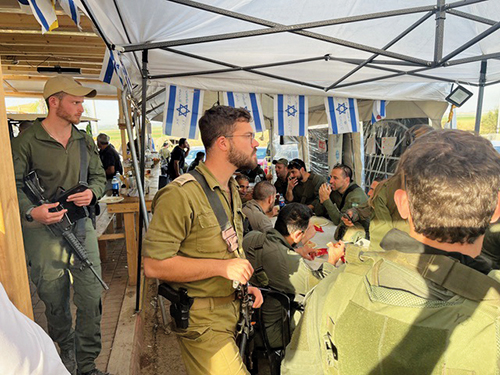
On March 1, 1961, President John F. Kennedy signed Executive Order 10924 establishing the Peace Corps. In his inaugural address he inspired the citizenry of the U.S. to dedicate themselves to a higher calling. The Peace Corps became an organ through which to do that. Likewise, Machal has existed for more than 75 years for foreign military volunteers. Today, there is a new calling. Israel needs us. If you are retired, go for a few weeks. If you are working, spend some of your vacation time as a volunteer. I met Americans who volunteer during the first part of the day and log onto their laptops to work U.S. hours in the afternoon and evening.
To get yourself into the right frame of mind, listen to a playlist of contemporary Israeli music before heading over. A whole genre of new or repurposed lyrics takes one from the darkness of night to the light of dawn. Helping us see that flowers will yet bloom and that yes, we will dance again.
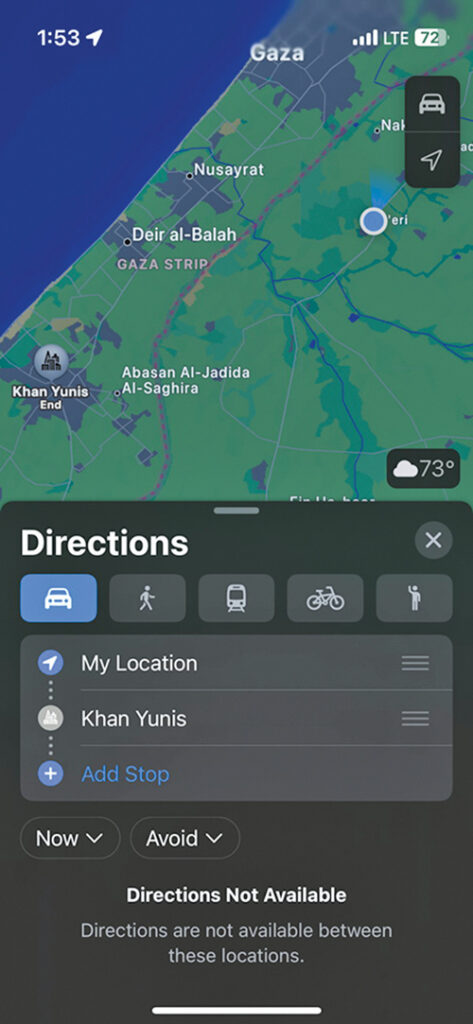
Clive Lipshitz and his family live in Teaneck.












